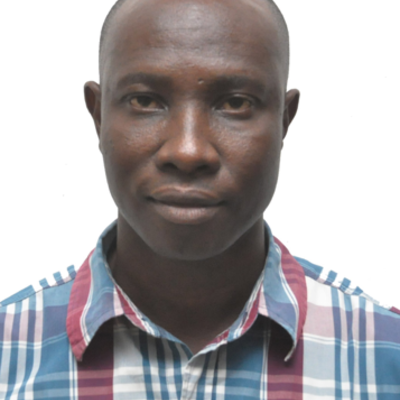Martin Luther Darko
The Coronavirus (Covid-19) pandemic has presented governments in the world with an important trade-off between “lives” and “livelihoods,” which is to say, between a public health objective of saving lives (by “flattening the curve”), and a mandate to maintain livelihoods and economic activity. The confirmed cases as well as Covid-19-related deaths are not abating by the day. This is a clear indicator of how devastating the pandemic is. Again, the economic damage of Covid-19 must be emphasised. The severity includes among others hunger, deprivation, desperation, delay in economic output, unemployment, lost wages, closed services, lack of international capital flow, and household distress. The pandemic has triggered an ethical dilemma for governments to choose between “lives” and “livelihoods”, i.e. between mitigating the public health fallout and averting an economic meltdown. It is a political choice between keeping a country’s citizens safe indoors or allowing citizens to participate in economic activities at the peril of their lives. This dilemma has been addressed by using a variety of approaches across countries. I focus attention to this conundrum of “lives (public health) versus livelihoods (economic activities)” within the Ghanaian context and how the government is maintaining the conflict (Lives versus Livelihoods) between these two opposing public values.
Globally, the impact of the pandemic on economies (livelihoods) is far reaching. In Africa, the problem is said to be compounded by what has come to be known in the Covid-19 discourse as “pre-existing conditions” of poverty and unwarranted labour making the trade-off between “lives and livelihoods” more dire. According to the Economic Commission for Africa (ECA):
”Africa’s cities are home to 600 million people and account for more than 50% of the region’s GDP… expected to be hit hard by COVID-19 related effects, leading to substantial losses in productive jobs. Firms and businesses, especially SMEs which account for 80% of employment in Africa are predicted to be highly vulnerable to Covid-19 effects. These risks are compounded by a likely hike in the cost of living as is expected for example by some initial reports of up to 100% increase in the price of some food items in some African cities” [source].
In April, the World Bank released its biannual Africa’s Pulse report on the impact of Covid-19 on the economies of Sub-Saharan Africa. It was predicted that economic growth will decline from 2.4% in 2019 to between -2.1% and -5.1%. The report projects that the region will experience its first recession in 25 years. These are the stack realities facing Ghana and other countries in Africa, realities that have direct consequences for the livelihoods of the population. It is within this predicted doom and gloom that I share Ghana’s lockdown experience. And how people across religious boundaries negotiate their lives in the midst of the coronavirus pandemic [source].
THE COVID-19 LOCKDOWN IN GHANA
On 12th March, the Health Minister announced Ghana’s first two cases at an emergency press briefing. The tests were performed at the Noguchi Memorial Institute for Medical Research, University of Ghana. The two cases were people who had returned to the country from Norway and Turkey, making them the first imported cases of Covid-19 in Ghana. Of the first two cases, one was a senior officer at the Norwegian Embassy in Ghana who had returned from Norway, while the other was a staff member at the United Nations (UN) offices in Ghana who had returned from Turkey. These two cases began the first contact tracing processes in Ghana.
On 15th March, at a press briefing on the state of Covid-19, the President banned all public gatherings, including conferences, workshops, funerals, festivals, political rallies, church activities and other related events to reduce the spread of Covid-19. Basic schools, senior high schools and universities, both public and private were closed. Besides, travellers to Ghana from countries which had recorded over 200 positive Covid-19 cases were denied entry. This restriction did not however apply to Ghanaian citizens and people with Ghanaian resident permits.
On 26th March, the Ghana Health Service reported 2 deaths with 65 new cases increasing Ghana’s case count to 132 and all health staff on (study) leave were recalled into active service in order to help reduce the increasing workload on health centres.
On 27th March, Ghana confirmed five new cases bringing the total number of infected cases to 137. The Upper West Region also recorded its first case as well. Subsequently, the President addressed the nation at 11pm and announced that some key places in Accra and Kumasi had been placed under a partial lock down, effective Monday 30 March 2020. However, members of the Executive, Legislature and the Judiciary and some essential services providers such as those that involve in the production, distribution and marketing of foods, beverages, pharmaceuticals, medicine, and paper and plastic packages, were exempted from the restriction [source].
As the case count for the pandemic kept rising by the day, it was obvious that some tough measures needed to be rolled out to avert a more devastating impact on lives and livelihoods. While the Ghana Medical Association (GMA) and other Identifiable Groups called for a full lockdown of the country, others thought otherwise, and argued that the social structure of the country should be considered, as there is no one-size-fits-all approach in dealing with the pandemic. While arguments about the appropriate type of lockdown dominated the airwaves, the President indicated in his address to the nation that
”…So, effective 1 am on Monday, 30th March, some forty-eight hours from now, I have imposed, pursuant to the powers granted the President of the Republic, under the Imposition of Restrictions Act, 2020 (Act 1012), restrictions on movement of persons in the Greater Accra Metropolitan Area (GAMA, which includes Awutu Senya East), and the Greater Kumasi Metropolitan Area and contiguous districts, for a period of two (2) weeks, subject to review.
…prevailing circumstances mean that stricter measures must be put in place to contain and halt the spread of the virus within our country. As a responsive Government, we will continue to implement bold measures to mitigate the impact of the Coronavirus on businesses and households and ensure that job losses are minimised.
…the Bank of Ghana predicting a worst-case GDP growth rate scenario of 1.5%for 2020, should the virus continue to linger for the rest of the year, the effects on our economy would be dire. However, we know what to do to bring our economy back to life. What we do not know how to do is to bring people back to life. We will, therefore, protect people’s lives than their livelihoods. We have prayed to Almighty God to heal our land, and I know that by the grace of God, he has heard our cry” [link to the full text of president Nana Akufo-Addo’s speech].
In analysing the speech of the President within the frame of “lives versus livelihoods”, it was obvious that the President and his team were more inclined towards the preservation of lives than livelihoods. To this extent, the following measures were outlined as a way protecting lives: Closing of the country’s borders to the outside world; a three-week lockdown of hotspots; wearing of face masks; social distancing; sanitizing one’s hands with alcohol-based sanitizers; washing of hands with soap under running water; closing of schools; ban on social gatherings; and provision of one hot meal for the vulnerable in the affected communities.
These measures, especially, the provision of one hot meal for the vulnerable in affected lockdown areas (Greater Accra Metropolitan Area, including Awutu Senya East, and the Greater Kumasi Metropolitan Area and contiguous districts) was meant to be the game changer. With about 90% of the Ghanaian workforce located in the informal sector, this social intervention policy was meant to keep them indoors and prevent the contraction and spread of the virus among such vulnerable populations.
However, the implementation of the free meal policy was attended by a lot of criticisms, as the sharing of the food was done devoid of the observance of the health protocols that will keep the citizens safe [source].
The politicisation of policy implementation in Ghana was not missed in the narrative. For instance, the Member of Parliament for Klortey-Korley Constituency Dr Zanetor Agyemang-Rawlings, daughter of the former head of state (Jerry John Rawlings), alleged that the food sharing was done along partisan lines (that is, the food was shared based on ones’ political party affiliation, NPP or NDC)[i] as captured in the headline: “Investigate ‘partisan’ food distribution in lockdown – Zanetor Rawlings to Akufo-Addo” [source].
This claim can not be dismissed because the picture below shows a volunteer wearing the paraphernalia of the governing party (NPP) on her hand gloves during the food sharing exercise as arrowed. For a national programme like this, it is important that the main actors act with a sense of neutrality to engender national cohesion.
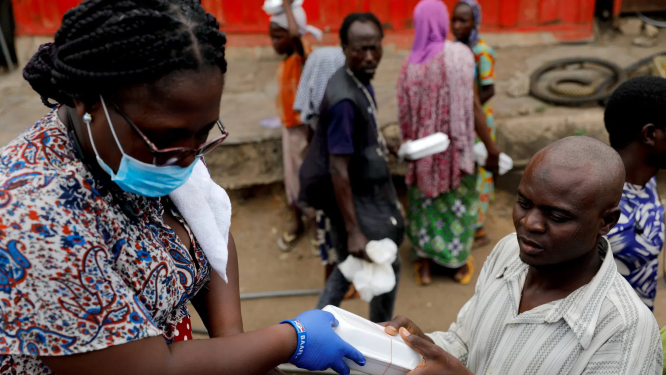
and homeless during Ghana partial lockdown in Accra and Kumasi [source].
The most vulnerable population (but also with high responsibilities) in the informal sector in Ghana is women. Obviously, any policy on the sector will have critical impact not only on these women, but their children and other dependants.
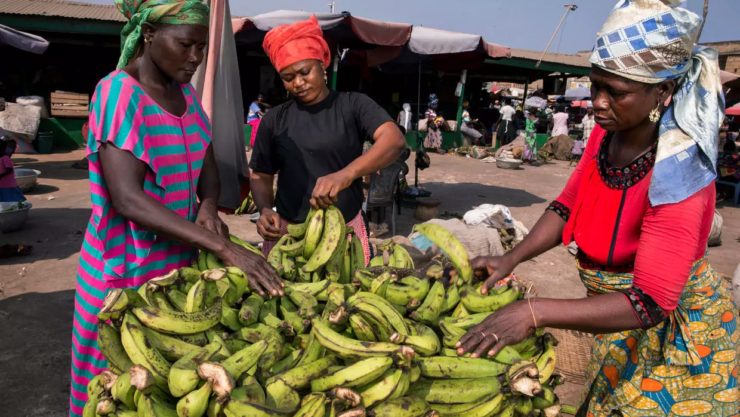
for fruits, vegetables, and other foods in Accra [source].
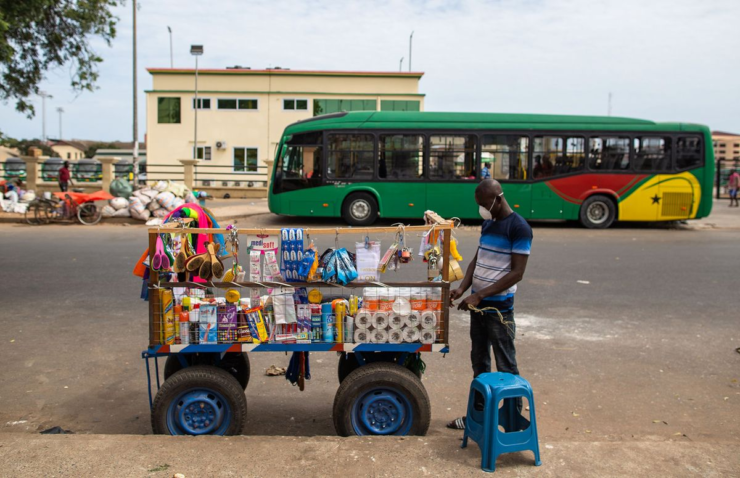
Photographer: Niphah Dennis/AFP via Getty Images [source: bloomberg.com].
In the analysis below I discuss how Covid-19 affected the population that are in the informal sector and other vulnerable groupings in Ghana.
LIFE AND LIVELIHOOD CONTESTATIONS
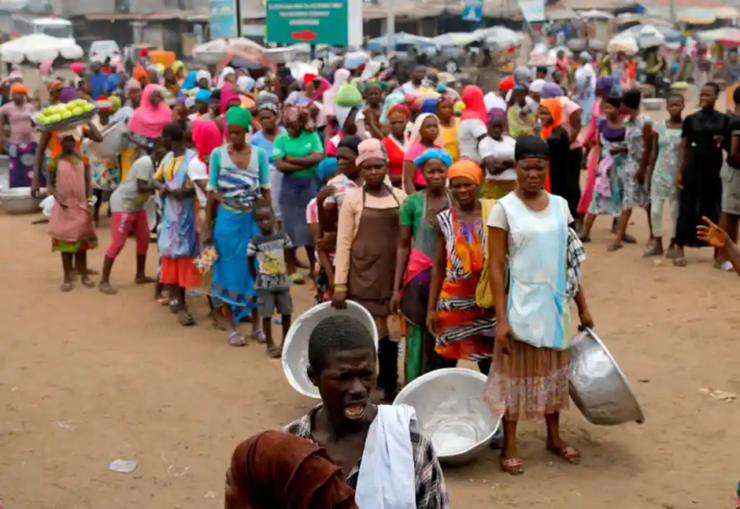
(Reuters, April 4th – source: the Guardian)
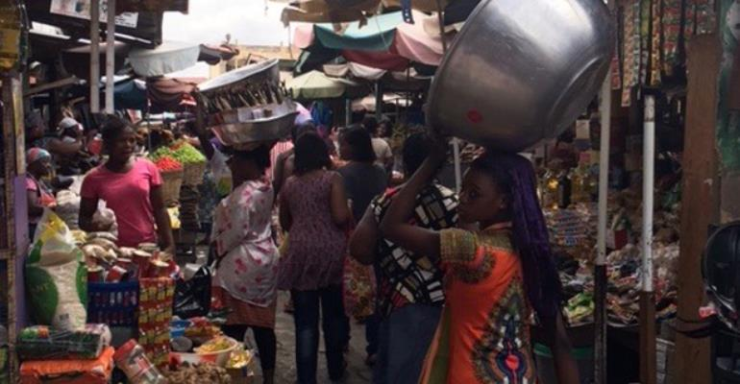
On the expiration of the two-week lockdown, the President extended it by one more week. It was during the one-week extension that the people in the affected areas started agitations because of hunger and deprivation. There were reported cases of people not adhering to the health protocols, citizens clashing with the security agencies enforcing the lockdown protocols, and markets were closed multiple times (Madina market included). The cooked food which the government promised the vulnerable groups was not forthcoming and the situation was gradually getting out of control.
One of the major online portals I monitored during the lockdown had this headline on the 4th of April: “COVID-19: Homeless struggle in Accra lockdown, beggars fighting police, lack of jobs, during restrictions” [source].
According to the report, “The homeless in Accra have become begging alarms for survival amid a lockdown imposed because of the deadly COVID-19 pandemic. They have lost their usual work of carrying shoppers’ goods or helping commercial drivers loading passengers.”
The report further indicated that the homeless begged pedestrians and commuters in order to survive without observing the live-saving protocols outlined to prevent the spread of the deadly Covid-19 disease. The report stressed that they rushed toward moving vehicles and took anything from anyone responding to their pleas, without gloves, masks or sanitizers which made them and others more vulnerable to risk from the deadly virus.
One of the beggars intimated “we don’t have food to eat that’s why we come to beg,”. He continued, “I have not eaten the whole day,” pulling up his shirt to show the reporter his flattened stomach.
When the reporter quizzed one of the beggars about the government’s free meals distribution, this is what he had to say: “I was beaten by the police when I arrived at the location for the distribution of the food.”
One kayayoo (female head porter) told Graphic online that, “I stay with my younger sibling and I need to get something to feed him, but I haven’t even eaten the whole day, so I decided to come out, I am going towards the market to see if I could help a shopper and buy food for myself and sibling from what I get.”
A shoe cobbler told the website that “police are just beating us,”he continued, “I have stayed home for over two weeks now, I do not have anything left to feed on so I decided to try my luck today with the hope that I might get something small for food…but the police do not understand my condition and started beaten me.”
He hoped the government will help the homeless and others on the streets to return to their towns because there is nothing to do in Accra.
An elderly beggar with six children also complained about police brutality amidst quest for survival during the lockdown. She said: “The police are not giving those of us who live on the streets any peace of mind, they (Police) will beat you up when you are found on the street.” She suggested the government should do more to help. They should bring us the raw ingredients instead of the cooked food and they should also add money to it.”
“I planned to come out to work on Monday whether or not the lockdown was lifted, we were really hungry” (a brick maker).
There were also contestations within the religious space. In Ghana, there are some things that are sacred in the lives of the people and nobody touches them under any circumstance: religion being one of such. This is a subject that many people believe defines our very existence.
As a result, various churches developed “the new normal” of conducting church services. Church services were held virtually through many of the social media platforms. For instance, the local branch of the Church of Pentecost that I belong to held services through Facebook live feed every Sunday for the members, whilst there were televised services at the national level for all members. Congregants were admonished to send their tithes and offerings through mobile money transfers to the local leadership. This was so for many of the churches in the city of Accra. The suggestion to pay tithes and offerings through mobile money channels to the church did not go down with many in the church. Whereas some were of the opinion that it was their religious covenant with their God, many also thought the least the church could do for them in times of this crisis was to give back the tithes and offerings they had paid all the years gone in the form of relief packages. Even though, virtual church services became the new order, there were agitations among religious leaders who wanted the government to lift the ban on religious gatherings. This action some observers perceived to be motivated by the lack of funds the churches had been denied as a result of the lockdown.
However, a leader of one of the ‘Mega’ churches (International Central Gospel Church), Pastor Mensah Otabil cautioned church leaders not to stampede the government into lifting the ban on religious gatherings but adapt to the ‘new normal’ [source]. While the contestations continued, some churches and other religious related NGOs got involved in the distribution of relief items (food, water, and shelter) to the homeless and vulnerable groups during the lockdown. For instance, The Catholic Church in Ghana through its humanitarian and development agency, Caritas Ghana, put together an emergency response plan to reach out to the poor and vulnerable during the lockdown [source]. An Islamic NGO, ‘People’s Dialogue on Human Settlements’ was also part of the religious groups that distributed essentials to the poor in society [source].
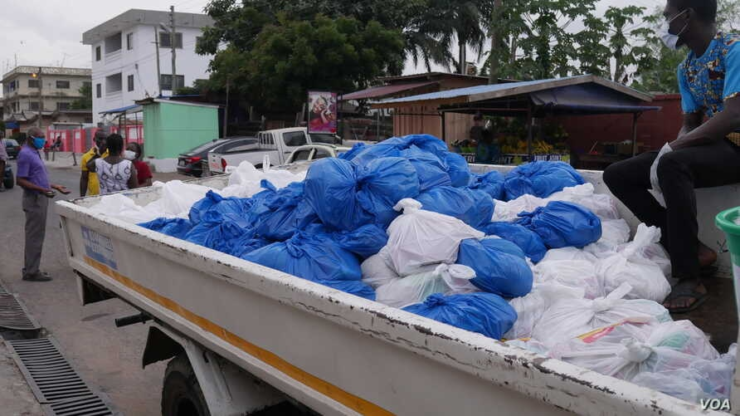
(Stacy Knott/ VOA, source).
These were a few of the contestations that characterised the three-week lockdown in greater Accra metropolitan Area.
In fact, the lockdown had to be lifted because the government could not sustain the free feeding policy which it said was costing the nation a whopping two million cedis (about three hundred and fifty thousand euros) daily. And for the many Ghanaian people working in the informal economy, each day of the lockdown deepened their worries. It did not therefore come as a surprise when on the 20th of April, the President announced the lifting of the partial lockdown, even though the case count on the pandemic had not been contained. However, the lifting of the lockdown was met with mixed reactions from the Ghanaian populace. While others observed that the move was premature because at the time the decision to lift the lockdown was taken the case count was more than 1000 with nine deaths, others on the other hand felt it was the best decision under the circumstances considering the size of the working population within the informal economy. A trader who sells television sets at Opera Square (a shopping hub in the Central Business Centre in Accra) observed: “There were a lot of issues. I had imported a lot of TVs and they were all locked up in the warehouse, and nothing was going on, so I personally didn’t support the lockdown. I have workers; how am I going to pay them when we are not selling? So, it was a big problem,” he said. A resident of East Legon (an affluential residential suburb in Accra), who works for digital creation firm Pulse Ghana, expressed his worries below: “The government should have waited at least a little bit longer,” he said. “People still haven’t got the actual understanding of what the situation is” [source]. The Secretary-General of Ghana’s Trade Union Congress had this to say regarding the lifting of the lockdown: “Nearly 90% of Ghanaians work in the informal economy, in a lockdown the impact can become unbearable, so we are happy with what the government has done” [source]. The immediate formal president of Ghana and the current flagbearer of the National Democratic Congress (NDC, the largest opposition party) also commented on the lifting of the lockdown by a post on his tweeter handle as captured below: “Concerns persist that the government has taken a gamble, many health experts continue to suggest the necessity and appropriateness of an extension of the restrictions” [source].
Whilst interest groups were expressing opinions on the lockdown, the Minister of Finance conceded that the policy to lockdown and feed the vulnerable groups in the affected areas could not have continued beyond the three weeks. He argued: “When you look at what happened during the lockdown, it was quite clear after a point that given that 90% of our population is informal and they go out each day to earn wages, it became increasingly impossible to continue with such a policy.” [source].
So, after three weeks of lock down the president announced the lifting of the restrictions it had imposed on parts of the country amidst wild jubilation from citizens in the affected areas. Markets and commercial districts that had ground to a halt have buzzed back to life. Stores and banks slowly reopened. Modest traffic jams emerged as many people who had escaped the lockdown returned to the city. But schools, places of worship restaurants and bars remain shut.
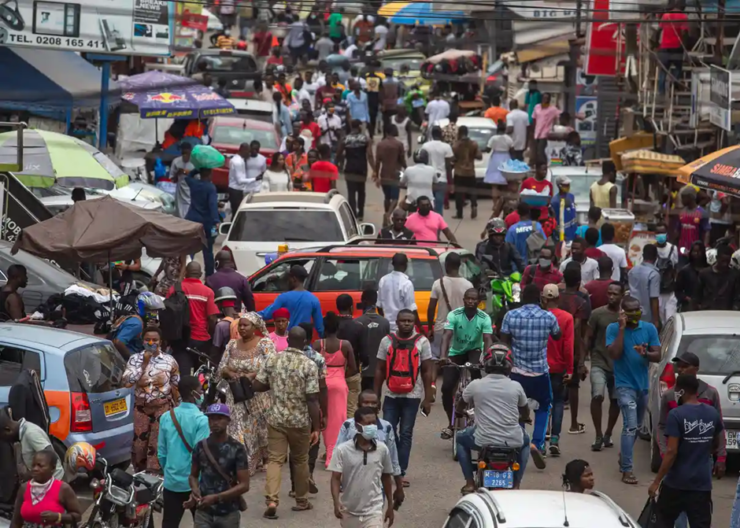
at Kwame Nkrumah Circle in Accra [source].
In conclusion, it is evident that everywhere the pandemic requires governments to tackle two conflicting public values: life and livelihood of the people. The skill to balance between these two conflicting values is very critical. Whichever way one looks at it, whether the preservation of lives through lockdown or the sustenance of livelihoods through engagement in economic activities, funds are needed to do either of them. To sustain a lockdown amidst revenue shortfalls and decline in export meant that the trade-off must tilt to one side of the act of balancing. Especially, in Africa, and Ghana, for that matter, the economic persuasion may hold sway. In simple terms, whereas it is possible to keep a long lockdown in Europe and other developed economies for longer periods of time as demonstrated by countries like China, Italy, Germany, the United Kingdom, the Netherlands and many more, it may be difficult for developing countries like Ghana to do same. Therefore, it was unsurprising when after three weeks the lockdown was lifted to bring a lease of life not only to the citizens (in the informal economy) but to the economy even when the case count for the pandemic had increased from the initial 137 at the time of the lockdown to 1042 when the lockdown was lifted.
This blog is a part of ‘Dossier Corona’, introduced by Religious Matters in the spring of 2020.
APPRECIATIONS: Prof Martha Frederiks, Prof Birgit Meyer, & Prof Kojo Senah.
[i] NPP (New Patriotic Party), the present governing political party; NDC (National Democratic Party), the present opposition political party.

